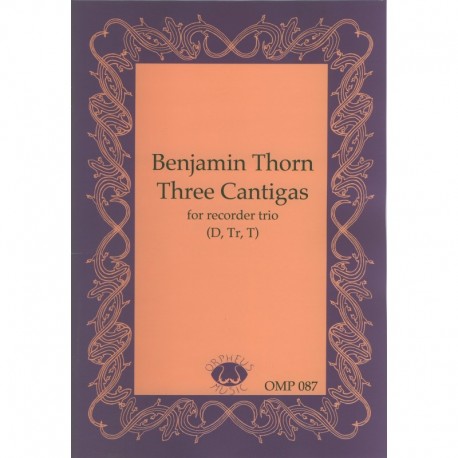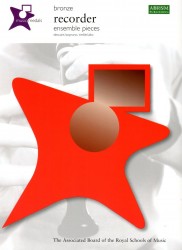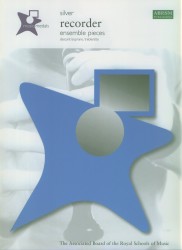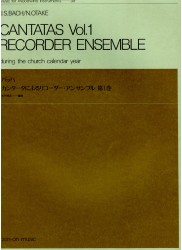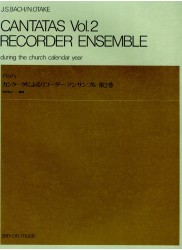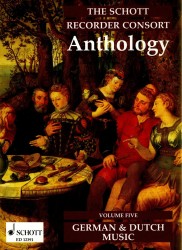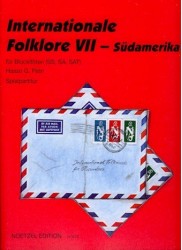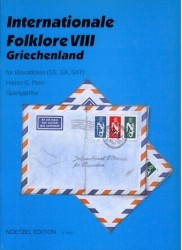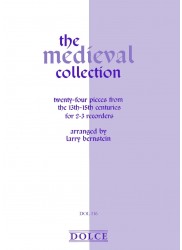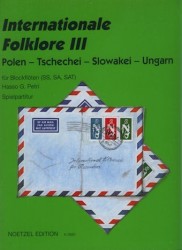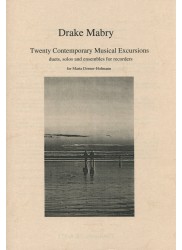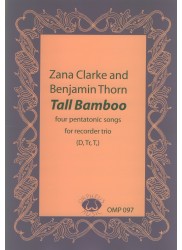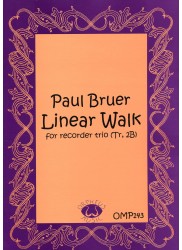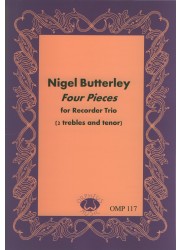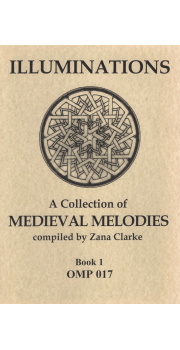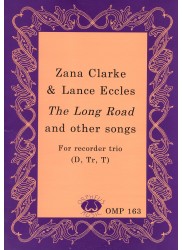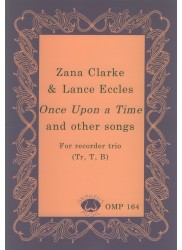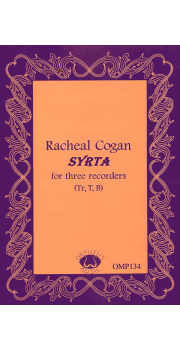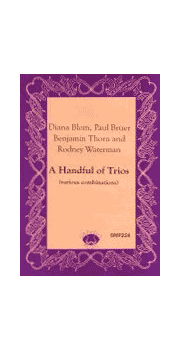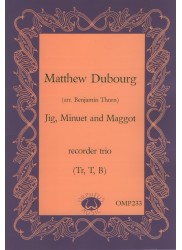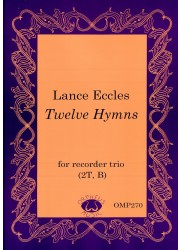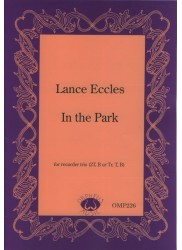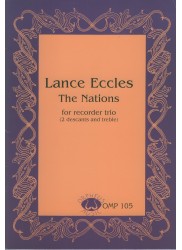No products
Prices are tax included
Three Cantigas
OMP087.pdf
PLEASE NOTE - DOWNLOADABLE PDF VERSION
Composer: Thorn - Benjamin
Instrumentation: Descant - Treble - Tenor
Period/genre: Australian Contemporary
Grade: Moderate
More info
*Three Contemporary Piece.* Fun lively and rhythmic arrangements of three Cantigas de Santa Maria from the 13th century.
1. Nas mentes senpre tener
2. A Madre do que liurou
3. Quen souber Santa Maria
Please note that due to the automated delivery of virtual products including pdf downloads, PayPal payment is required at the checkout - we are unable to accept the cheque payment method for these items.
_Score 7 pp. Parts 3 pp. Downloadable PDF file - 526 Kb._
OMP087 Benjamin Thorn Three Cantigas
The melodies of Benjamin Thorn's three Cantigas for recorder trio derive from the 13th century Cantigas de Santa Maria collection by Alfonso X of Castle and Leon. Infused with energy and passion, the Cantigas would make an ideal programme opener as the melodies maintain a rhythmic impulse that is both timeless and infectious. Highly recommended.
Louise Phillips, The Recorder Magazine Winter 2002 Vol. 22 no. 4
OMP075 Benjamin Thorn, Bouncing.
OMP087 Benjamin Thorn, Three Cantigas.
Both of these new ensemble works by Thorn are very much worth looking into. Bouncing, a three-movement (fast-slow-fast) piece for double choir is not at all difficult to execute. Its conservative tonal language and general simplicity make it easy to conceptualise and therefore quite suitable for young players who would surely enjoy performing it.
The more challenging Three Cantigas for recorder trio is a very exciting piece based on melodies that, according to the edition's notes, "come from the 13th century 'Cantigas de Santa Maria' collected by AIfonso X (known as the Wise) of Castile and Leon." Thorn accentuates the aura of antiquity in his accompaniments by emphasizing the open-interval sounds of perfect fourths and fifths. I personally consider these pieces to be more than mere arrangements. Thorn has created highly unorthodox contexts for these old tunes by encasing them in dense polyphonic textures.
These pieces are not quite newly conceived compositions either. The borrowed melodies always remain the absolute central focus, and Thorn, unlike many contemporary composers, does not subject his quoted material to any kind of deconstruction (or least not in this work). These editions are excellent, as is usually the case with Orpheus.
Pete Rose, American Recorder, March 2004
30 other products in the same category:
Reference: 9781860966033
Brand: ABRSM
Music Medals: Bronze Recorder Ensemble Pieces
Composer: ABRSM Instrumentation: Descant/Treble - various combinations...
In StockReference: 9781860966040
Brand: ABRSM
Music Medals: Silver Recorder Ensemble Pieces
Composer: ABRSM Instrumentation: Descant/Treble - various combinations...
Out of stockReference: 509021
Brand: Zen-on
JS Bach Cantatas Church Year Vol 1
Composer: Bach - Johann Sebastian Arranger: N Otake Instrumentation: 2 - 5...
In StockReference: 509022
Brand: Zen-on
JS Bach Cantatas Church Year Vol 2
Composer: Bach - Johann Sebastian Instrumentation: 3 - 5 Recorders - various...
In StockReference: ED12391
Brand: Schott
Schott Recorder Consort Anthology: German & Dutch Music Vol 5
Composer: Various Arranger: Ed Bernard Thomas Instrumentation: 3 - 5...
In StockReference: N3875
Brand: Noetzel
International Folk Music Vol 7: South America
Composer: Traditional Arranger: Hasso Petri Instrumentation: Descant -...
In StockReference: N3910
Brand: Noetzel
International Folk Music Vol 8: Greece
Composer: TraditionalArranger: Hasso PetriInstrumentation: Descant - Treble -...
In StockReference: DOL116
Brand: Dolce
The Medieval Collection
Composer: Various Arranger: Larry Bernstein Instrumentation: Treble - Tenor...
In StockReference: N3880
Brand: Noetzel
International Folk Music Vol 3
Composer: TraditionalArranger: Hasso PetriInstrumentation: Various...
In StockReference: FEA171
Brand: Flautando Edition
Twenty Contemporary Musical Excursions
Composer: Mabry - Drake Instrumentation: Treble/2 Trebles/3 Trebles...
In StockReference: OMP097
Brand: Orpheus Music
Tall Bamboo
Composer: Thorn/ClarkeInstrumentation: Descant - Treble - TenorPeriod/genre:...
In StockReference: OMP097.pdf
Brand: Orpheus Music
Tall Bamboo
PLEASE NOTE - DOWNLOADABLE PDF VERSION Composer: Thorn/ClarkeInstrumentation:...
$19.00 -20%In StockReference: OMP143
Brand: Orpheus Music
Linear Walk
Composer: Bruer - PaulInstrumentation: Treble - 2 BassesPeriod/genre:...
In StockReference: OMP117
Brand: Orpheus Music
Four Pieces for Recorder Trio
Composer: Butterley - Nigel Instrumentation: 2 Trebles - Tenor...
In StockReference: OMP117.pdf
Brand: Orpheus Music
Four Pieces for Recorder Trio
PLEASE NOTE - DOWNLOADABLE PDF VERSION Composer: Butterley - Nigel...
$20.50 -20%In StockReference: OMP017
Brand: Orpheus Music
Illuminations Vol 1
Composer: Clarke - Zana Instrumentation: Descant/Treble/Tenor - solos and...
In StockReference: OMP163
Brand: Orpheus Music
The Long Road and other songs
Composer: Clarke/EcclesInstrumentation: Descant - Treble - TenorPeriod/genre:...
In StockReference: OMP163.pdf
Brand: Orpheus Music
The Long Road and other songs
PLEASE NOTE - DOWNLOADABLE PDF VERSION Composer:...
$19.00 -20%In StockReference: OMP164
Brand: Orpheus Music
Once upon a Time and other songs
Composer: Clarke/EcclesInstrumentation: Treble - Tenor - BassPeriod/genre:...
In StockReference: OMP164.pdf
Brand: Orpheus Music
Once upon a Time and other songs
PLEASE NOTE - DOWNLOADABLE PDF VERSION Composer:...
$20.50 -20%In StockReference: OMP134
Brand: Orpheus Music
Syrta
Composer: Cogan - Racheal Instrumentation: Treble - Tenor - Bass...
In StockReference: OMP134.pdf
Brand: Orpheus Music
Syrta
PLEASE NOTE - DOWNLOADABLE PDF VERSION Composer: Cogan -...
$17.50 -20%In StockReference: OMP224*
Brand: Orpheus Music
A Handful of Trios
Composer: Blom, Bruer, Thorn & Waterman Instrumentation: Various trios
In StockReference: OMP224.pdf
Brand: Orpheus Music
A Handful of Trios
PLEASE NOTE - DOWNLOADABLE PDF VERSION ONLY. Composer: Blom, Bruer, Thorn &...
$20.50 -20%In StockReference: OMP233*
Brand: Orpheus Music
Jig, Minuet and Maggot
Composer: Dubourg - Matthew Instrumentation: Treble - Tenor - Bass...
In StockReference: OMP233.pdf
Brand: Orpheus Music
Jig, Minuet and Maggot
PLEASE NOTE - DOWNLOADABLE PDF VERSION Composer: Dubourg - Matthew...
$17.50 -20%In StockReference: OMP270
Brand: Orpheus Music
Twelve Hymns
Composer: Eccles - Lance Instrumentation: 2 Tenors - Bass Period/genre:...
In StockReference: OMP226
Brand: Orpheus Music
In the Park
Composer: Eccles - LanceInstrumentation: 2 Trebles - Treble/Bass - Tenor -...
In StockReference: OMP226.pdf
Brand: Orpheus Music
In the Park
PLEASE NOTE - DOWNLOADABLE PDF VERSION Composer: Eccles -...
$19.00 -20%In StockReference: OMP105
Brand: Orpheus Music
The Nations
Composer: Eccles - LanceInstrumentation: Descant - Treble -...
In Stock

